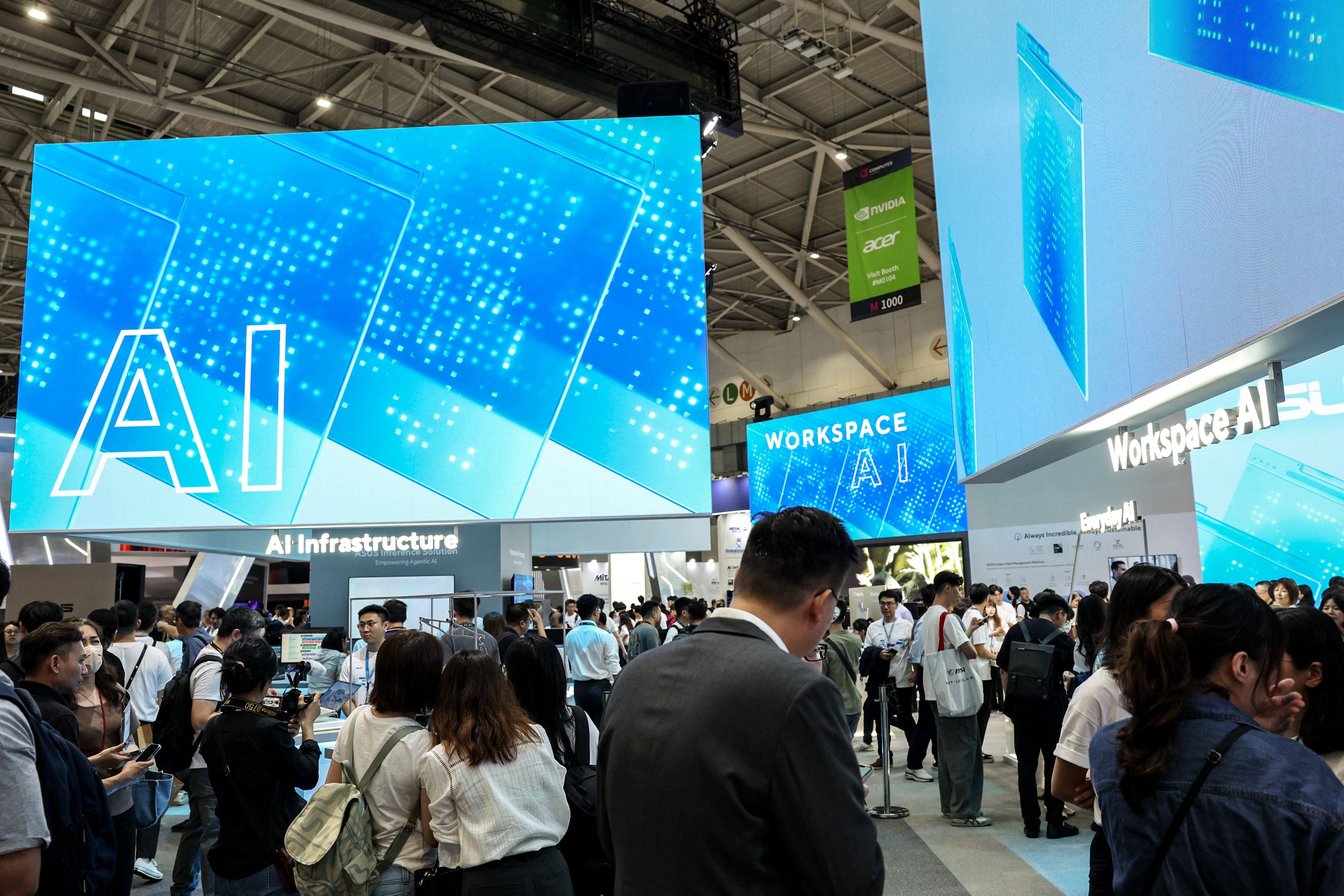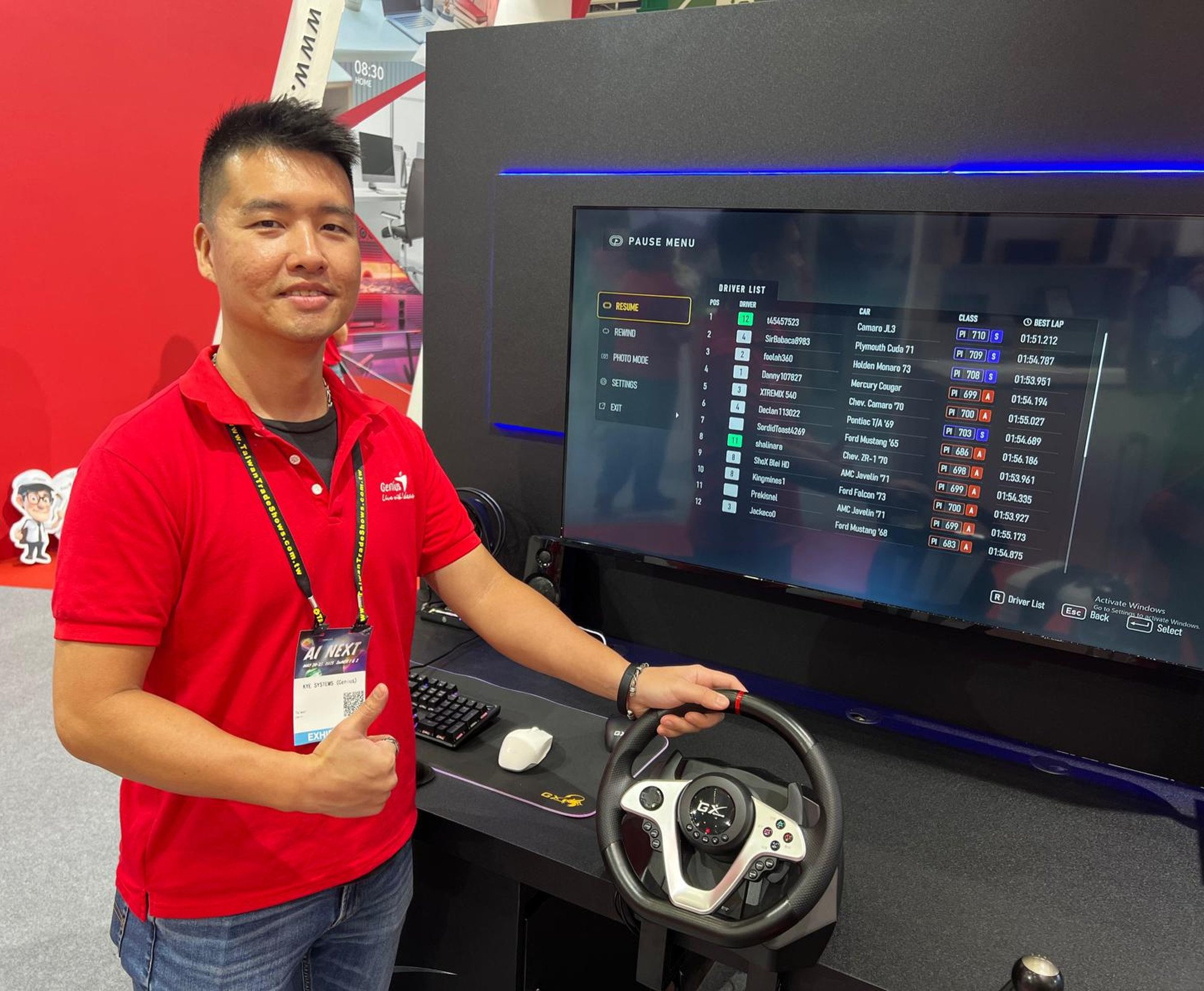Trade war elephant in the showroom at Computex Taipei, Asia’s biggest tech expo
As Trump threatens to reinstate high tariffs on Taiwan, tech-sector exporters reliant on the US market fear the worst

There was an elephant in the showroom at this year’s Computex Taipei tech expo.
Loud speakers boomed the guttural sounds of action games loud enough to be heard across dozens of booths, where blazing white lights glinted off the thin black edges of new microprocessors on display. Some of the show’s 86,521 prospective buyers tried out AI-enabled laptops with 3D displays – visible without special glasses – screening a country lane in Japan one moment, a complicated colon surgery the next.
And graphics card developer Nvidia’s CEO, Jensen Huang, talked big about building a “supercomputer” for start-ups in Taiwan, where the show took place.
But the scene differed little from Computex 2024, held 18 months after OpenAI’s game-changing release of ChatGPT.
By June last year, that window had given developers enough time to release foundational hardware, such as AI computing chips and accelerators for cloud servers – a boost to Taiwan’s economic growth, including an unexpectedly fast 5.37 per cent year-on-year uptick in the first quarter of 2025.
Instead, this year’s show rolled out incremental improvements, such as mouse clicks that activate AI software and microphones that allow users to issue commands. Huang did not hit the exhibition floor this year to sign autographs, unlike in 2024 when wave after wave of show-goers queued at the larger booths to sample AI-powered laptops.
But in the grand scheme of things, that was just a bug. Now, the elephant.
Many of the 1,400 exhibitors worried this year about US President Donald Trump’s proposed 32 per cent tariff rate on Taiwanese exports to their plum market, the United States.
Among those exports were the PCs, peripherals, cables, routers and power supplies showcased at Computex from May 20-23.
The elephant in the room was hardly a talking point for exhibitors trying to put on a brave face in the quest for buyers, but it reared up on its hind legs if someone asked.
Acer, headquartered near Taipei and one of the world’s top PC brands, took a pass on discussing tariffs.
Fellow Computex exhibitor Kye Systems, a suburban Taipei-based firm that makes microphones, speakers and wireless mice under the Genius brand, has decided to avoid the US market despite a wealth of potential customers.
“For the US, I’m not sure now is the moment – because of Trump,” Kye Systems sales representative Miguel Yeh told me as he demonstrated a mouse that activates AI software on PCs. “We have to wait a while.”
If many exporters fear a looming elephant, those who outsource manufacturing to mainland China could face a veritable woolly mammoth as Trump has threatened tariffs that could drive the cumulative rate up to 245 per cent on products made there.
“We have a factory in China and it would have super high tariffs,” said Yeh, whose company sells mainly to Latin America. The US market, he said, “is not going to work.”
Cecilia Chao, senior international manager of Taiwanese fibre optic cable maker FiTek Photonics, waxed ebulliently about her 26-year-old company’s “invisible” cables for wiring up the likes of lifts and data centres.
But her voice dropped when asked about the July 9 deadline for Taiwan and the US to reach a deal that would reduce Washington’s threat of unusually high 32 per cent tariffs. Washington is simultaneously pursuing trade negotiations with mainland China, Japan, Vietnam and many other trading partners.
“This is all increasing costs for our customers,” Chao said, citing tariffs already in place and calling the US a major market. “Customers still need to fill orders.”
Taiwan has held two rounds of tariff negotiations with the United States and branched into other issues, such as trade barriers and “economic security,” Taiwan Vice-Premier Cheng Li-Chun said in a statement in May.
Taiwan’s leader William Lai said on May 20 that talks with the US were “ongoing and proceeding smoothly”.
But showroom exhibitors were girding for a resumption of tariffs just in case the talks fail. Without a deal by July, Taiwan’s tech companies are expected to shun the American market, share the cost with importers, raise prices or route US-bound shipments through other countries.
“You’ve just got to see what the governments do,” said Sandy Gu, product director with jjPlus, a Taiwanese company that sells fire-resistant e-bike charging systems in the US and Europe.
Taiwan and the US, under Trump, have also quit talking about a trade agreement that was expected to cover labour and the environment, a deputy trade representative from Taipei said in March.
That deal would have helped Taiwanese exporters “validate themselves as firms that meet, if not exceed, American and international standards”, said Ken Wu, president of the Formosan Association for Public Affairs advocacy group’s Los Angeles chapter.
Taiwanese exhibitors also said they were on guard for the threat of high local currency rates after a spike last month.
And while few cared to talk much about the elephant, just about everyone was devising ways to tame it.
Taiwanese tech firms were doing as much business as possible in US dollars or other currencies to avoid losing money on conversions back to the New Taiwan dollar.
A couple of developers acknowledged front-loading orders to the US in case higher tariffs take hold.
Networking device maker Konten Networks, for example, has seen a threefold increase in orders since January, following its forecast of higher US duties, according to product director Uwai Chen, who I approached at the expo.
“We saw this situation coming, so we did our utmost to help our clients speed deliveries.”

Sintrones Technology has a long-standing buffer against the impact of US tariffs. Its core clients, commercial vehicle makers in Mexico, receive Sintrones components for autonomous driving and fleet management, then ship finished vehicles to the US, the Taiwanese firm’s product manager, Ko Hojen, said.
Trump wants Taiwanese companies, among others, to produce their wares in the US to avoid tariffs. But so far, it is mostly only the biggest of the big that could afford the costs of manufacturing in America.
Most notably, Taiwan Semiconductor Manufacturing Company (TSMC), the world’s largest contract chipmaker, raised its US investment pledge from US$65 billion to US$165 billion in March.
Nanya Technology Corp., a top Taiwanese maker of memory chips, has scoped out its own US investment possibilities given likely “rates of return” in the United States versus at home, investor relations office head Dora Tou said in March.
Back to that elephant.
Trump could proceed with high tariffs since Taiwan has a large trade surplus with the US, said Kent Chong, a partner at the professional services firm PwC in Taipei. The 2024 gap reached a record US$64.9 billion.
Chong was not at the show, but he gets queries from some of Taiwan’s wealthiest people about the impact of global events.
“I think it’s fair to say the reciprocal tariffs are a measure that applies… particularly to those countries that have the largest trade deficits from the US.”